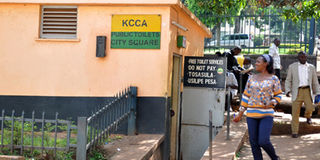Can public toilets pose a health risk?

People walk past a public toilet at the Constitutional Square. Health experts say the poor hygiene of these facilities makes them a major source of infections. Photo by Rachel Mabala
Before John Kayiima changed jobs, he had an office with a private restroom. His current workplace, however, is a much bigger place, with hundreds of employees. It also has a shared toilet, and several urinal points.
Kayiima says the restrooms are usually busy, and his biggest problem is the general hygiene.
“Whenever I use the restrooms, I experience stomach problems. So what I do now is ensure I do not have any body contact with the toilet seat,” he says.
Kayiima believes most times, the stomach upset he develops results from diseases or infections he has contracted from the toilets.
“The toilet is a source of several infections so a person needs to take care when they use some of these shared facilities,” he says.
Immaculate Nalubega, a civil servant, says many public toilets she has been to around Kampala are hygienically unhealthy, with many lacking flush water most of the time.
“I usually squat instead of sitting on the toilet bowl because you do not know which person has been using the same facility,” she says.
Dr Hajjirah Kataike, a general practitioner at Kibuli Hospital says many shared toilets have become sources of several infections.
This is because bacteria live off moisture and organic food (or waste), which are common in public restrooms.
Explaining what could have resulted in Kayiima’s stomach upset, Dr Kataike says he possibly contracted gastrointestinal infection, which, like many germs could have spread from contact with the toilet tap.
Safety for children
Jennifer Jolly Tusiime, the in-charge nurse at City Hall Health Centre IV, says the facility treats several cases of fungal infections especially among children, which she attributes to the nature of restrooms that are shared in schools.
“The toilets that children use at school should be kept clean and disinfected at all times. Before parents take their children to particular schools, they need to ensure it has good sanitation facilities,” says Tusiime.
On the other hand, Dr Kataike says children have a higher risk for infections because “they like sharing a lot, which exposes them to such risks.”
Dr Kataike notes that while many of the infections are easily treatable without causing serious health problems, prevention should be emphasised.
Type of toilet
Jude Byansi, the Kampala Capital City Authority, sanitation and water supervisor, says because public toilets are shared by a big number of people, it is better to have lavatories that allow a person to squat, instead of sitting. “That is why many people opt to squat on top of the toilet seats instead of sitting on them for fear of contracting disease and infections,” says Byansi.
He adds: “Ideally, sit-down toilets should be reserved for the elderly and persons with disability.”
Byansi says for public toilets where a user has to seat instead of squat, providing disposable seat covers, and using disinfectants to clean the seats are crucial steps to keep infections away.
Dr Kataike also advises especially men, to avoid urinating and let it spill all over the restroom, a scenario that is common in many public toilets.
He says because people do not care to clean the floor, this is likely to cause odour and act as a breeding ground for germs and bacteria.
Beside seat covers, Byansi says public toilets should provide antibacterial cleansers that can be used after each visit to the toilet.
Toiletry supplies
Lack of supplies such as toilet paper, hand drying towels or soap can also increase the unhygienic conditions of a restroom, therefore, Byansi says they need to be provided at all public toilets.
He says after visiting the toilet and washing hands, a person should ensure that they dry their hands thoroughly, since wet hands can increase the the lifespan of germs, which increase the risk of infection.
“One of the best ways to avoid infection is by washing your hands with soap after using the toilet. This will prevent the germs from spreading and reduce the risk of infection,” says Byansi.
What the public says >
“I am happy with the toilets at the Constitutional Square because it has water at all times,”
Christine Namara, Mobile Money Operator
“I rarely use public toilets in the city because they are always smelly and flooded with water. They need to be managed by professionals.
Kenneth Mangeni, Graduate
“In Spain, all public places such as bus stations, restaurants and shopping centres have free and clean toilets with running water. This is not the case here,”
Bora Nakanjugo, Spanish Volunteer
“We have few, congested public toilets, which are not clean because of the big numbers of people who use them daily. This is a shame. The authorities should build more toilets,” Ferguson Muluga, Marketer




